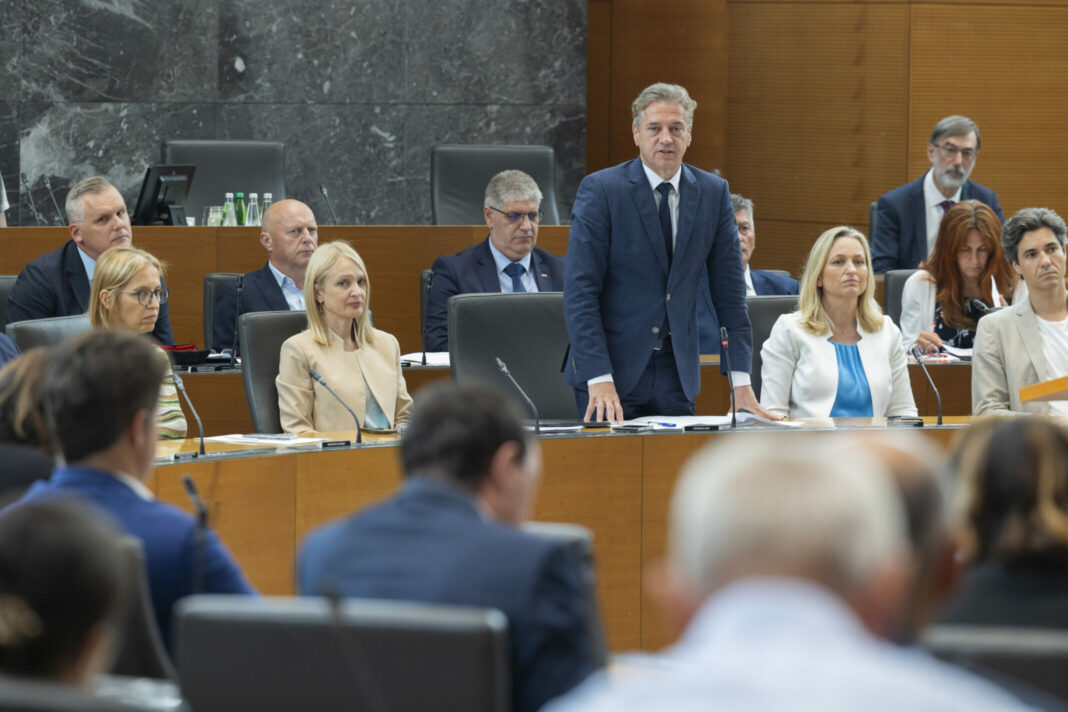By: G. B.
There were many things wrong with the purchase of the judicial building on Litijska Street, and it has already had political consequences within the government and coalition parties, emphasised Prime Minister Robert Golob in response to questions from opposition MPs regarding this purchase in the National Assembly. The Prime Minister is confident that the Ministry of Finance will be able to clarify the accusations related to the purchase.
MP Janez Cigler Kralj (NSi) highlighted in his question to Prime Minister Robert Golob the draft proposal of the audit report of the final account of the budget for 2023, within which the Court of Audit also examined the correctness of the purchase of the building on Litijska Street. Among other things, it found that there was no basis for reallocating 6.5 million euros from the budget reserve for the purposes of purchasing the judicial building, and that the Ministry of Justice did not plan the purchase in the 2023 budget, did not have secured funds and investment documentation for it, and there was no comprehensive inspection of the premises and offers, he emphasised.
Regarding the purchase of laptops, which the Ministry of Digital Transformation bought to increase digital inclusion, the draft report reveals that the ministry decided on the purchase without prior determination of actual needs. “Just for storing these laptops in Logatec, taxpayers have already paid 13,000 euros, not to mention the mess in their distribution,” emphasised Cigler Kralj.
He also touched on the transformation of supplementary health insurance into a mandatory contribution. Cigler Kralj noted that due to the “fraud” with the transformation of supplementary health insurance, 33.5 million euros will have to be paid to insurance companies, which also harmed policyholders. He is interested in how and when the government will take responsibility for the disputed and wasteful use of public funds in these matters and what it will do if the accusations from the draft audit report of the Court of Audit are confirmed.
MP Rado Gladek (SDS) was also interested in why the government did not conduct prior needs analysis when addressing the spatial constraints of the courts, calling it a “similar story” to the computers. She asked the Prime Minister when he plans to hold the Minister of Finance, Klemen Boštjančič, accountable for approving the reallocation of budget reserve funds without assessing the appropriateness of the purchase, thus violating several articles of the Public Finance Act.
“Such buildings should be purchased through public tenders, openly, not in a way that someone plays Santa Claus during Christmas time and brings someone seven million,” she highlighted.
The Prime Minister agreed that there were many things wrong with the purchase of the judicial building on Litijska Street, which also had political consequences within the government and coalition parties. He recalled that there is an extensive police investigation underway regarding the purchase of the judicial building. Golob believes that the relevant authorities will be able to ascertain all the facts related to this matter and hopes that those responsible will be held accountable.
Golob believes that the Ministry of Finance will be able to provide appropriate explanations and agreements on the draft report of the Court of Audit regarding why the procedures were carried out as they were. Concerning the draft audit of the Court of Audit, he reiterated that the audit reports are not final. The Court of Audit Act is clear, he emphasised. “Until the matter is clarified, it remains confidential. Not because I want it that way or anyone else wants it differently, but because the law says so, and I will stick to the law,” Golob stressed. Golob also noted that the Slovenian judiciary is facing serious spatial problems. “We will need to make a significant step forward in this area,” he highlighted.
Well, another evasive answer, as we could have expected. The audit also revealed the direct responsibility of the Prime Minister for the Litijska Street affair, yet Golob is now acting indifferent before the public.
Golob dismissed the accusations that the government harmed policyholders by transforming supplementary health insurance as complete falsehoods. He recalled that private insurance companies began announcing price increases of five, ten, or even more euros in May or June last year, which the government and parliament limited. The transformation of supplementary health insurance was the first successful measure of this government, he emphasised, reminding that the transformation saved policyholders 120 million euros. Regarding the accusations about the purchase of computers, Golob is confident that the Minister for Digital Transformation, Emilija Stojmenova Duh, will be able to explain them.
Golob also notes that the opposition has been dealing with the same evergreen topics for at least a year now, at a time when the first undeniable results of this government’s work are starting to show. “All of Europe envies us for our economic growth, inflation rate, and unemployment rate,” he highlighted among other things.
Wow, what confidence. Well, in that case, if Golob has acknowledged the responsibility of Stojmenova Duh, he should propose her replacement or support her impeachment. However, in his responses to parliamentary questions, he again sugar-coated things while admitting a bit of guilt just in case.

